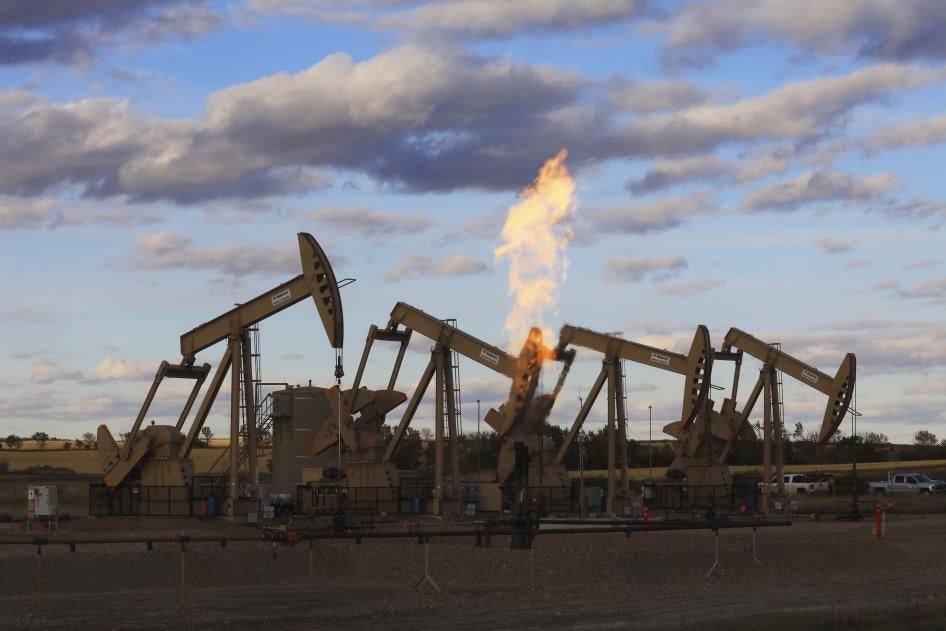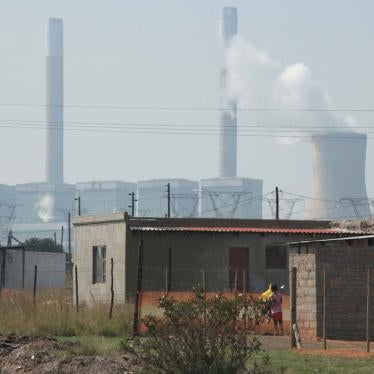Government financial support for fossil fuels, including through subsidies, presents a key obstacle to achieving emissions reductions urgently needed to address the climate crisis. Subsidies artificially reduce the costs of fossil fuel production and use, driving continued fossil fuel dependence at a time when governments should be rapidly transitioning away from fossil fuels toward clean, renewable energies like wind and solar.
Despite a brief reduction in emissions due to Covid-19 lockdowns, carbon dioxide levels continued to grow in 2020. As a result, the world is still on course to reach catastrophic warming this century, risking increased extreme weather events, flooding, fires, species extinction, and ecosystem loss. Fossil fuels remain the main source of emissions driving this crisis, responsible, alongside industry, for roughly 89 percent of carbon dioxide emissions in 2018.
Even at the current level of warming, climate change is already having a profound impact on human rights. In 2020, Human Rights Watch documented how climate change in Canada is depleting Indigenous peoples’ access to traditional food sources and contributing to a growing problem of food poverty. In Colombia, we showed how more frequent droughts are worsening malnutrition among Indigenous children. In the US, we exposed how extreme heat is linked to adverse birth outcomes, including preterm birth. These are only a few of the growing impacts experienced around the world that are expected to intensify as temperatures continue to rise in coming years.
There is little time left – about nine years according to the United Nations climate science body – to keep warming below 1.5°C above pre-industrial temperatures and prevent the worst possible outcomes from climate change. But reaching this goal demands a radical increase in mitigation efforts: countries must increase the ambition of their first Paris Agreement pledges at least fivefold to reach a 1.5°C pathway. As part of this effort, global fossil fuel production needs to decrease by around six percent between 2020 and 2030.
Despite this urgency, governments around the world directly subsidize the fossil fuel sector by billions of dollars each year, and government support for fossil fuel companies has increased as part of Covid-19 recovery spending. The sector also benefits from inadequate environmental regulations and little accountability for clean-up, allowing companies to externalize the true cost of fossil fuels by avoiding paying for environmental, health, and economic impacts.
This question-and-answer document examines the critical role that government financial support plays in perpetuating the production and use of fossil fuels, and why governments urgently need to phase out support for coal, oil, and gas in order to meet their human rights obligation to address the climate crisis.
What are fossil fuel subsidies?
A subsidy is defined by the World Trade Organization as “a financial contribution by a government or any public body” that confers a benefit on the recipient. Fossil fuel subsidies often take the form of tax breaks or direct payouts. But they can also include price controls, loan guarantees, research and development funding, and measures that allow fossil fuel producers to avoid paying the cost of complying with environmental regulations, for example where governments provide funds for fossil fuel companies to reduce their emissions or to remediate direct environmental impacts of fossil fuel sector activities.
Fossil fuel subsidies generally fall into one of two categories: consumer or producer subsidies. Consumer subsidies reduce the cost of burning fossil fuels for energy, sometimes with the stated intention of reducing household energy costs and addressing energy poverty.
Producer subsidies, meanwhile, are targeted at companies, and reduce the cost of coal, oil, and gas exploration, transport (pipelines, shipping), and related processing/infrastructure (LNG terminals, refineries, etc.). Support for carbon capture, utilization, and storage (CCUS), despite being presented as a climate solution, also often functions as a fossil fuel producer subsidy, as most captured carbon is injected into wells as a means of extracting more oil.
In addition to supporting domestic fossil fuel production and use, some governments also subsidize fossil fuel production and consumption abroad through their export credit agencies, international development agencies, or other forms of public finance.
How much money are we talking about when it comes to fossil fuel subsidies?
It is difficult to conclusively assess the full extent of global fossil fuel subsidies because governments do not transparently report the full extent of their support for fossil fuels. Current estimates show that global fossil fuel subsidy totals are, at minimum, in the hundreds of billions of dollars each year. As of 2019, G20 governments, representing the world’s major economies, supported coal, oil, and gas production and consumption by, on average, $548 billion per year.
Fossil fuel subsidies far exceed government financial support for renewable energy sources, with fossil fuel subsidy levels in 2017, for example, almost 20 times what governments provided for renewables.
A significant disparity in support also exists in international public finance, such as from export credit agencies. G20 countries provided at least $77 billion a year through their international public finance institutions from 2016-2018 to support oil, gas, and coal projects around the world, more than three times as much as for clean energy. China is the largest public financer of fossil fuels at $24.6 billion a year, and Canada, the second largest supporter – and largest on a per capita basis – at $10.6 billion a year. Looking at coal alone, China, Japan, and Korea, are the three largest public financers.
What are the consequences of fossil fuel subsidies?
When governments subsidize fossil fuels, they encourage more fossil fuel use than would otherwise occur. In some cases, subsidies create the potential for companies to expand or build new fossil fuel infrastructure that locks in years more fossil fuel use and delays the transition to renewables.
By increasing fossil fuel use, these subsidies increase the GHG emissions that are fueling global warming, resulting in foreseeable harms if warming is not kept to 1.5˚C. Or, in the words of United Nations Secretary-General António Guterres, subsidizing fossil fuels equals spending taxpayers’ money to “boost hurricanes, to spread droughts, to melt glaciers, to bleach corals: to destroy the world.” Fossil fuel subsidies also compete with other priority public spending on education, social protection, and healthcare.
As fossil fuel subsidies come from public finances, they reduce governments’ ability to allocate adequate resources to combat climate change and support communities already facing climate impacts. In the United States, for example, one study, commissioned by Pew, found that if energy-related subsidies that increased CO2 emissions had been eliminated from 2005-2009, an average of $12 billion per year in spending would have been saved. This is money that could have been invested in sustainable energy infrastructure and provided communities with the tools and resources to adapt to the climate impacts they are already experiencing.
In subsidizing fossil fuels, governments are also supporting an industry sector that is responsible for extensive costs – to the environment, human health, and infrastructure – as a result of environmental degradation, pollution, and climate change, costs that are largely being borne by communities and governments rather than the companies responsible. In the United States, for example, Human Rights Watch has documented the public health threat posed by mountaintop removal coal mining as a result of air and water pollution from mining processes.
Such costs, which economists and companies identify as “externalities,” are quantified by the International Monetary Fund (IMF) as reaching $5.2 trillion in 2017, or 6.5 percent of the global GDP. In the US alone, the cost of unpaid environmental damage would constitute an almost $600 billion annual subsidy for fossil fuel companies, according to a peer-reviewed study published by the US National Academy of Sciences.
Are fossil fuel subsidies key to addressing energy poverty or supporting poverty reduction?
While some subsidies, especially consumer subsidies, may be presented as a way to reduce fuel costs and benefit low-income households, fossil fuel subsidies are an inefficient way to address energy poverty and largely benefit wealthier households. Subsidies are often regressive and even reinforce existing income inequalities, since the top income quintile captures a large share of the financial support. An IMF study found that 61 percent of gasoline subsidies went to the richest 20 percent in low- and middle-income countries, while only three percent went to the bottom 20 percent. Subsidies for diesel and liquefied petroleum gas show a similar regressive pattern, with most support being captured by the top.
While people with low incomes or those living in poverty may benefit from fossil fuel subsidies through lower transport and food costs, fossil fuel subsidies risk wasting scarce public funds that could instead be invested in reducing fossil fuel dependence or on other sectors with much more substantial benefits for people in or near poverty, such as social protection and healthcare.
What does international human rights law say about fossil fuel subsidies?
Under international human rights law, governments have a human rights obligation to address human-induced climate change. This obligation requires governments not only to address harms from climate impacts, but also to prevent further foreseeable harm caused by climate change, including by reducing greenhouse gas emissions. By continuing to subsidize fossil fuels, governments are undermining their ability to uphold this obligation.
Governments also have an obligation to progressively realize economic, social and cultural rights, which includes the obligation to mobilize the maximum available resources to prevent foreseeable harms from climate change. Fossil fuel subsidies come out of public finances and divert funds away from the “maximum available resources” needed to combat climate change. In a 2019 joint statement, five UN human rights treaty bodies – independent experts monitoring state compliance with human rights treaties – maintained that “States should also discontinue financial incentives or investments in activities and infrastructure that are not consistent with low greenhouse gas emissions pathways … as a mitigation measure to prevent further damage and risk.”
In working to progressively realize rights impacted by climate change – such as the rights to health, food, and water – governments are by and large prohibited from taking measures that, directly or indirectly, negatively affect the enjoyment of rights. Funding increased fossil fuel production and consumption, such as through fossil fuel subsidies or other forms of financial support, actively contributes to increased emissions and related climate impacts that are already eroding the enjoyment of human rights around the world, particularly for marginalized communities. As a result, where a government introduces a new fossil fuel subsidy in the face of the current climate crisis, such a measure could constitute a rights violation to the extent that it contributes to increased emissions.
Are governments, and especially the big emitters, doing enough, in line with their human rights obligations, to phase out fossil fuel subsidies?
The simple answer is, no, they are not. While many governments have committed to rolling back support for fossil fuels, progress toward a global fossil fuel subsidy phase out has been unacceptably slow.
Both the G7 and G20, informal groupings of the world’s largest economies and most of the world’s top emitters, committed in 2009 to phase out “inefficient” fossil fuel subsidies, and in 2016 the G7 committed to do so by 2025. Neither group, however, has made much progress. Part of the delay comes down to an argument over semantics, with governments exploiting the lack of definition for what constitutes an “inefficient” subsidy in order to avoid phasing out certain forms of financial support for fossil fuels.
As of 2019, ten years after committing to phase out inefficient fossil fuel subsidies, G20 governments had only achieved a nine percent drop in support for fossil fuels, including subsidies, relative to the 2014-2016 annual average. Seven G20 countries—Australia, Canada, China, France, India, Russia, and South Africa—actually increased their support for fossil fuels in 2017-2019 relative to 2014-2016. During the Covid-19 pandemic, G20 countries have further increased their support for fossil fuels, allocating at least $277 billion in public money to fossil fuel-intensive sectors.
Positively, momentum is now building for a fossil fuel subsidy phase out. US President Joe Biden, for example, committed to demanding a worldwide ban on fossil fuel subsidies in his election platform, stating, “There is simply no excuse for subsidizing fossil fuel.” Since taking office, he has directed federal agencies to eliminate fossil fuel subsides. The European Union, similarly, has called for a global phase-out of environmentally harmful fossil-fuel subsidies along a clear timeline and committed to putting the full force of its energy diplomacy behind this push. The UK has also committed to halting public finance for fossil fuel projects abroad, starting in 2021.
What should governments do?
This year governments are expected to deliver updated Paris Agreement commitments outlining the climate targets, policies, and measures they will implement to do their part to limit global warming to 1.5˚C. As part of these submissions, governments should include time-bound plans for phasing out fossil fuel subsidies.
In the immediate term, governments should allocate the maximum available resources toward preventing harm from climate change by shifting support away from fossil fuels and toward proven emissions reduction efforts like renewable energy, clean transport, and energy efficiency measures. Governments should also ensure that they are able to allocate the maximum available resources to support communities in adapting to climate impacts, and to addressing existing impacts, especially among marginalized communities experiencing the brunt of climate impacts.
In eliminating fossil fuel subsidies, especially consumer subsidies, governments should mitigate rights impacts that may result from increased energy costs by ensuring all people have access to reliable, sufficient, affordable, clean, and renewable energy. Governments also need to ensure a just transition, for example by making sure that subsidy cuts are not used as an excuse to cut workers’ salaries. While there is no single recipe for successful subsidy reform, countries should adopt measures to protect people in or near poverty through cash or in-kind transfers in the event of price increases that affect their ability to reach an adequate standard of living. Countries should ensure that social security safety nets are in place for everyone in need.
Finally, governments should not introduce new fossil fuel subsidies, direct or indirect, including as part of new Covid-recovery spending. Where general financial support is made available, including to fossil fuel sector companies, it should be conditioned on meeting emissions reduction requirements and transparent climate risk disclosure.









